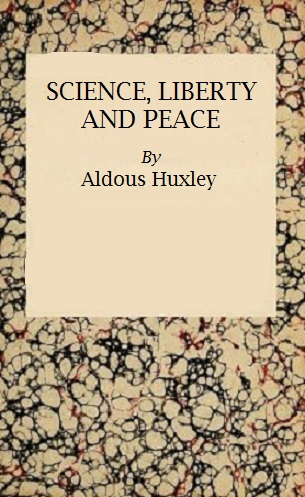
Science, Liberty and Peace is an essay written by Aldous Huxley, published in 1946. The essay is an opinionated discussion covering a wide range of subjects reflecting Huxley’s views towards society at that time. He puts forward a number of predictions, many of which turned out to be true up to 60 years later. A consistent theme throughout the essay is Huxley’s preference towards a decentralised society.
The paragraph above is the book promo at Faded Page, a website that offer free eBooks. I have not liked Huxley’s fiction much but his nonfiction has been good. This is a very short book of only some 86 pages but he says a lot that I agree with in those few pages. I have just a few quotes and suggest that you download a copy.
If the arrangement of society is bad (as ours is), and a small number of people have power over the majority and oppress it, every victory over Nature will inevitably serve only to increase that power and that oppression. This is what is actually happening. — Leo Tolstoy
In the paragraphs that follow I shall enumerate the more obviously significant of these ways, shall indicate how and by what means applied science has contributed hitherto
toward the centralization of power in the hands of a small ruling minority, and also how and by what means such tendencies may be resisted and ultimately, perhaps, reversed.
Undesirable propaganda will not cease until the persons who pay for propaganda either change their minds, or are replaced by other persons willing to pay for something else. Meanwhile there is no remedy for the evil except personal self–denial. Reading newspapers and listening to the radio are psychological addictions; and psychological addictions, like the physiological addictions to drugs, tobacco and alcohol, can only be put an end to by a voluntary effort on the part of the addict.
The belief in all–round progress is based upon the wishful dream that one can get something for nothing. Its underlying assumption is that gains in one field do not have to be paid for by losses in other fields. For the ancient Greeks, hubris, or overweening insolence, whether directed against the gods, or one’s fellow–men, or nature, was sure to be followed, sooner or later, in one way or another, by avenging Nemesis. Unlike the Greeks, we of the twentieth century believe that we can be insolent with impunity. So intense is our faith in the dogma of inevitable progress that it has survived two world wars and still remains flourishing in spite of totalitarianism…

Yesterday afternoon I had two dear visit my Park site. Not quite in the site but within 30-50 yards. I’m reasonably sure these were two of the four that I saw in the shotgun range. They are more domesticated than many cattle that I have come across.
My first home was in a rural area and I walked in a field where deer surrounded me. I wouldn’t call them domesticated,they were simply curious and knew I posed no threat to them.
Beautiful creatures aren’t they?-Mary
Two deer, probably the same two, were back again this evening. This time they were within 20-30 yards of two men and their two dogs. One of the dogs barked a couple of time and the deer looked up but did not move away. They are not curious they have just become very accustomed to being around people and have no fear.